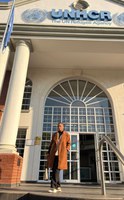
Centering Youth Voices in Policy: A Reflection on the UNFPA YAP Policy Review

The session reminded me why youth participation is not a privilege but a right, especially when democracy is strained, and young people’s voices are so often sidelined.
One of the key themes discussed was the state of youth participation in policymaking. While young people are deeply affected by global and local politics, we rarely have the platform to influence them. The rise of AI, misinformation, and exclusionary digital behaviour has further pushed many young people out of spaces where critical decisions are being made, especially those from rural areas or marginalised identities. We reflected on how global shifts, like the Trump administration’s regressive stance on SRHR and queer rights, continue to echo in African contexts, identities, and futures.
Throughout the session, I was reminded of my time as a FLAC (Feminist Leadership and Activism Centre) fellow, and how I had benefited from that programme. FLAC equipped me with a foundation in intersectional advocacy, understanding how race, gender, class, disability, and climate justice are all interconnected. That lens was invaluable as I engaged in conversations around youth autonomy, representation, and inclusion in the UNFPA space.
Speakers like Thulani Mbatha emphasised the need to strengthen the SRHR rights approach, particularly regarding choice and bodily autonomy. Discussions on teenage pregnancy, education, gender-based violence (GBV), and youth empowerment made it clear that young people are not just stakeholders we are change-makers. Therefore, Thulani spoke to the importance of grounding our advocacy in lived realities, ensuring community-based organisations (CBOs) are resourced to respond effectively, and using our stories to shape policy.
Buhle Geleba powerfully noted that young people must be co-creators of development, not just passive beneficiaries. In my thematic group, we discussed the representation, sustainability, and scalability of YAP. We proposed more intentional engagement through CBOs, improved feedback mechanisms, and a greater focus on language, religion, and culture as tools for inclusion rather than exclusion.
At the end of the meeting, Ms. Precious Mogogadi, a Youth and Adolescent Specialist at UNFPA, emphasised the importance of raising your hand and your voice to be heard in such spaces. She encouraged participants to take the opportunity to represent themselves, as they are the narrators of their own lived experiences. If they don’t speak up, no one will know their stories. "The table has been set for you, now use it,” she said.
Thinking about this experience, I feel even more dedicated to telling my story to represent my demographic. Programs like FLAC, YAP, etc., help us learn, grow, and advocate better. They remind us that young people are not just the leaders of tomorrow, we are the leaders today.
